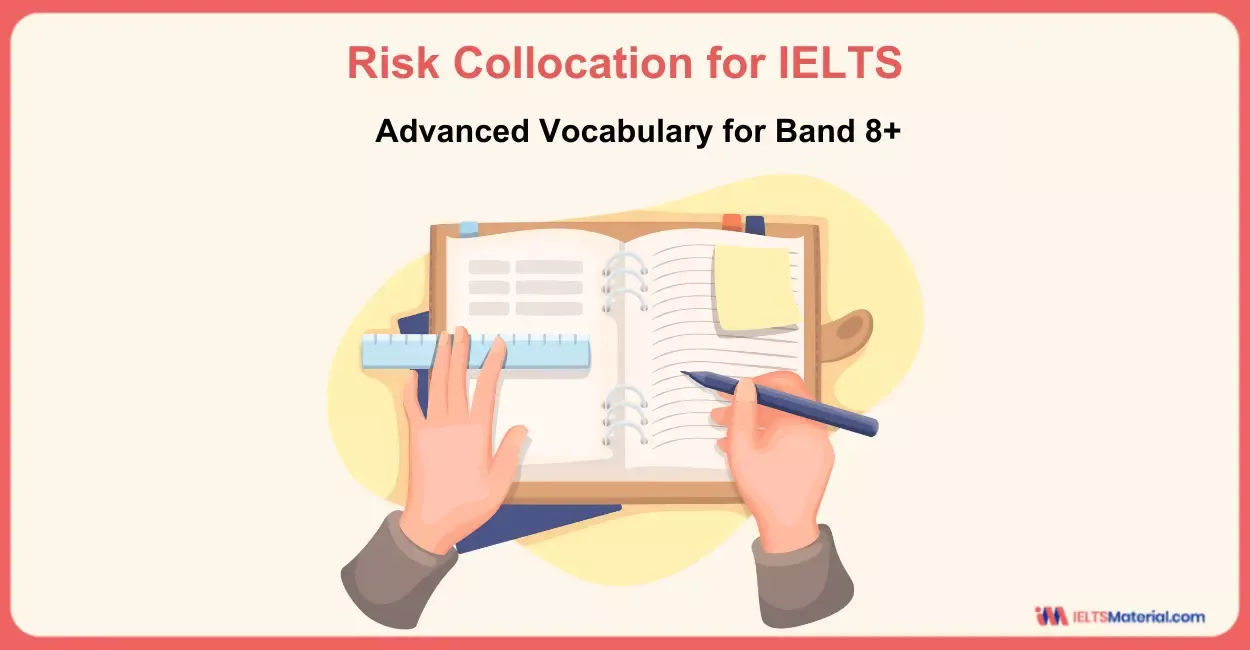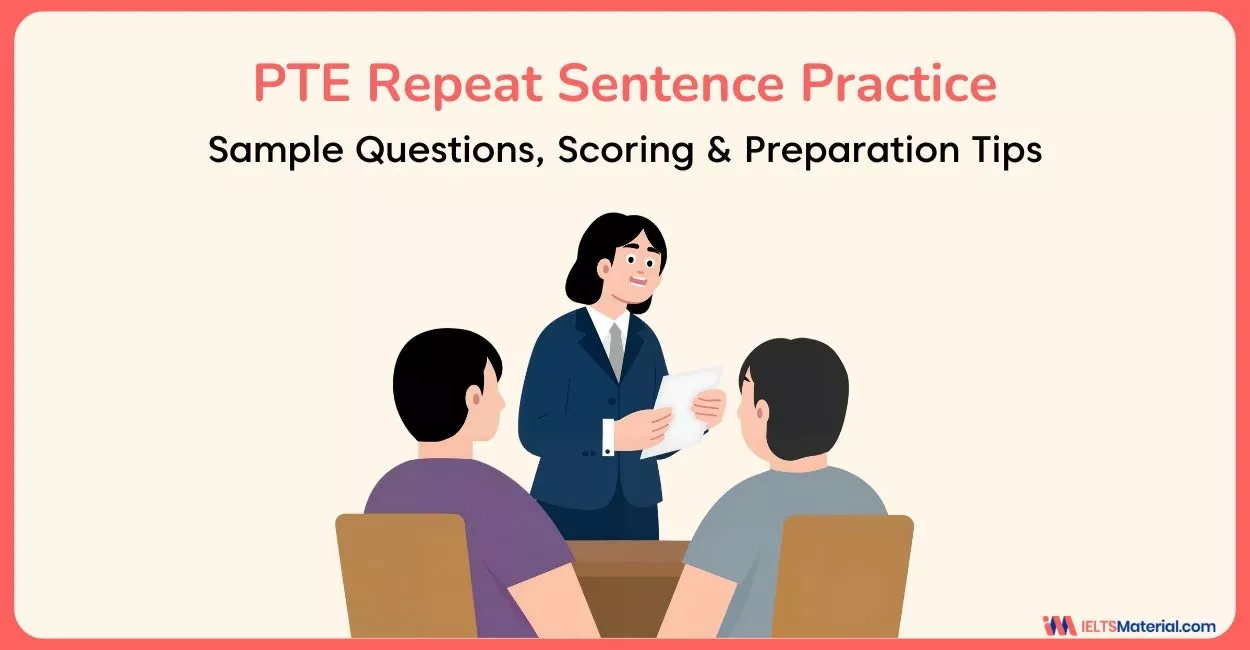Risk Collocation for IELTS - Advanced Vocabulary for Band 8+
6 min read
Updated On
-
Copy link
Elevate your preparation with the advanced vocabulary in risk collocation for IELTS and achieve a band 8+. Discover how to use verbs, adjectives, and common expressions with “risk” and learn to express ideas clearly as well as precisely.
Table of Contents

Limited-Time Offer : Access a FREE 10-Day IELTS Study Plan!
Native speakers naturally combine words such as Risk Collocations for IELTS to showcase their proficiency in the language. It can be combined with a wide range of verbs, adjectives, and nouns to form collocations. To get band 8+ in the IELTS Exam, you must first understand how to use such an advanced grammatical topic in different IELTS contexts and then practice examples for both Speaking and Writing tasks. By incorporating this into your IELTS preparation, you will take a step closer to your desired band score.
Connect with our IELTS Trainers to crack your IELTS exam in no time! FREE Demo.
What are the Types of Risk Collocation for IELTS?
Before you start using the risk collocation for Speaking and IELTS Writing Sections, you need to first understand the different types. With this knowledge, you will be able to make use of such advanced vocabulary and achieve a band 8+. Before you include this into your preparation, let’s look at the three basic types of risk collocation for IELTS along with its example so that you would know when to use it.
1. Verb + Risk
Various verbs are associated with “risk” to describe actions which you might take from a perspective of danger, uncertainty, or possibility.
-
Face a risk - to confront possible danger
|
Residents living near the river constantly face the risk of flooding. |
-
Run the risk - to accept a possible negative outcome
|
If the invigilator finds anyone cheating, then one might run the risk of being disqualified. |
2. Common Adjective + Risk Collocations
Adjectives help specify the degree or type of risk. You can use these in IELTS Writing Task 2 essays when you discuss topics such as environment, health, or technology.
-
High/severe risk - high danger
|
Obesity carries a high risk of diabetes. |
-
Potential risk - possible danger
|
Climate change is a potential risk for future generations. |
3. Common Expressions with Risk
There are certain common expressions with the term "risk" which can enhance your spoken and written answers immensely.
-
At risk of - in danger of something
|
Many endangered animals are at risk of extinction. |
-
Worth the risk - benefit justifies the danger
|
For many students, studying abroad is worth the risk. |
Check out the Top 10 IELTS Grammar Books and get a chance to score a band 8+.
List of 10 Common Risk Collocation for IELTS
Learning the different types of collocations is imperative since you can use them in your IELTS Speaking and Writing tasks. However, remember that to get a band 8+, it is necessary for you to first learn the common collocations along with its meaning and then understand how to use them in sentences. Let’s check out the list of 10 common risk collocations for IELTS which will help you elevate your knowledge and help you in your responses.
|
Collocation |
Meaning |
Example |
|
1. Take a risk |
Doing something that could cause danger or loss |
Many entrepreneurs are willing to take a risk to be successful. |
|
2. At risk |
In danger |
There are many endangered species that are at risk of extinction. |
|
3. High risk |
Having a high chance of danger |
Smoking is a high risk behavior which can create serious health problems. |
|
4. Low risk |
Having a little chance of danger |
Government bonds are believed to be a low-risk investment. |
|
5. Reduce the risk |
Decrease the chance of being hurt |
Regular exercise reduces the risk of heart disease. |
|
6. Risk factor |
One thing that increases the possibility of hazard |
Obesity is a major risk factor for diabetes. |
|
7. Pose a risk |
Present a danger |
Climate change poses a risk to food security all over the globe. |
|
8. Take calculated risks |
Take risks after considering the consequences |
There are several times that leaders are willing to take calculated risks. |
|
9. Risk Management |
The process by which risks are handled effectively |
Risk management is paramount in the financial markets. |
|
10. Be at Great Risk |
In great danger |
Refugees are often at great risk during their escape from their countries. |
Prepare yourself with An Exclusive Grammar Workbook: Guide to All Grammatical Woes!
Exercise on Risk Collocations for IELTS
Once you understand how to use the risk collocations for IELTS, it is time to delve into exercises that test the practical implementation of these collocations in real contexts. Let’s explore different practice exercises below which will help you to know where to improve.
EXERCISE 1. Use the correct form of these verbs where you would use the collocation verb + risk:
|
carry |
consider |
pose |
|
outweigh |
reduce |
take |
1 A fatty diet increases the risk of heart disease whereas a low fat diet ___________ the risk.
2 We cannot afford to ___________ risks when people’s lives are involved.
3 Boxing is a contact sport which ___________ a high risk of injury. However, wearing protective headgear can help minimise the risk of head injury.
4 The chemicals in food are not dangerous. They ___________ little risk to health.
5 I’ve ___________ all the risks of having the operation and I’ve decided to go ahead.
6 All things considered, the benefits of this treatment___________ the risks.
EXERCISE 2. Use the correct form of these verbs where you would use the common adjective collocation:
|
calculated |
potential |
|
real |
unnecessary |
1 I must warn you that there is a small, but ___________ risk that something could go wrong.
2 The director took a___________ risk, giving the film’s main role to an unknown actor, but it paid off. The film was a great success.
3 The information in this leaflet warns young people of the ___________ risks to health associated with drug use.
4 You are exposing yourself to ___________ risks by walking through the park alone at night.
EXERCISE 3. Use the correct form of these verbs where you would use the common expressions:
|
aware |
prepared |
|
small |
worth |
1 I want to take no risks, however ___________
2 That’s a risk I’m not___________ to take.
3 If we buy these shares, we might lose all our money! It’s just not ___________ the risk.
4 It’s OK. I’m fully___________ of the risks involved.
EXERCISE 4. How big a risk? Mark the following sentences (B) if they describe a big risk and (S) if they describe a small risk:
1 Hygiene is so bad in this hospital that there is a serious risk of infection.
2 There is a slight risk of side-effects with this drug. You may feel a little sick or dizzy at times.
3 Please remember that any financial investment contains an element of risk, but it’s only a minimal risk as far as we are concerned.
4 He sold his house and invested the money in the stock market. It was a huge risk to take, but it proved worthwhile in the end. He’s now a millionaire.
5 You’ve got to wear protective goggles as the light is very strong and there’s a high risk of damage to your eyesight.
6 Lots of war correspondents carry out their work at great risk to themselves.
Answers for the Exercise on Risk Collocation for IELTS
Great! Now, compare your answers with the correct ones and see if you correctly applied the collocations. This will help you in understanding how it fits in your own answer according to the context and will lead you toward a higher IELTS Band Score.
Exercise 1:
|
|
|
|
|
|
Exercise 2:
|
1. real |
2. calculated |
|
3. potential |
4. unnecessary |
Exercise 3:
|
1. small |
2. prepared |
|
3. worth |
4. aware |
Exercise 4:
|
1. B |
2. S |
3. S |
|
4. B |
5. B |
6. B |
Enroll into our Free IELTS Webinar and learn more about techniques to improve your grammar for IELTS.
As you prepare yourself for the IELTS exam, learning the appropriate IELTS Vocabulary is vital to score a band 8+. While writing an essay about environmental issues or talking about personal experiences during the Speaking part, correct use of risk collocation for IELTS can help to strengthen your lexical resource score. Remember that you have to use them correctly in the right context to sound more natural, so keep practicing!
Also Check:

Start Preparing for IELTS: Get Your 10-Day Study Plan Today!
Explore other IELTS Articles

Haniya Yashfeen

Kasturika Samanta
Recent Articles

Nitika Gupt

Nehasri Ravishenbagam

Nehasri Ravishenbagam







Post your Comments